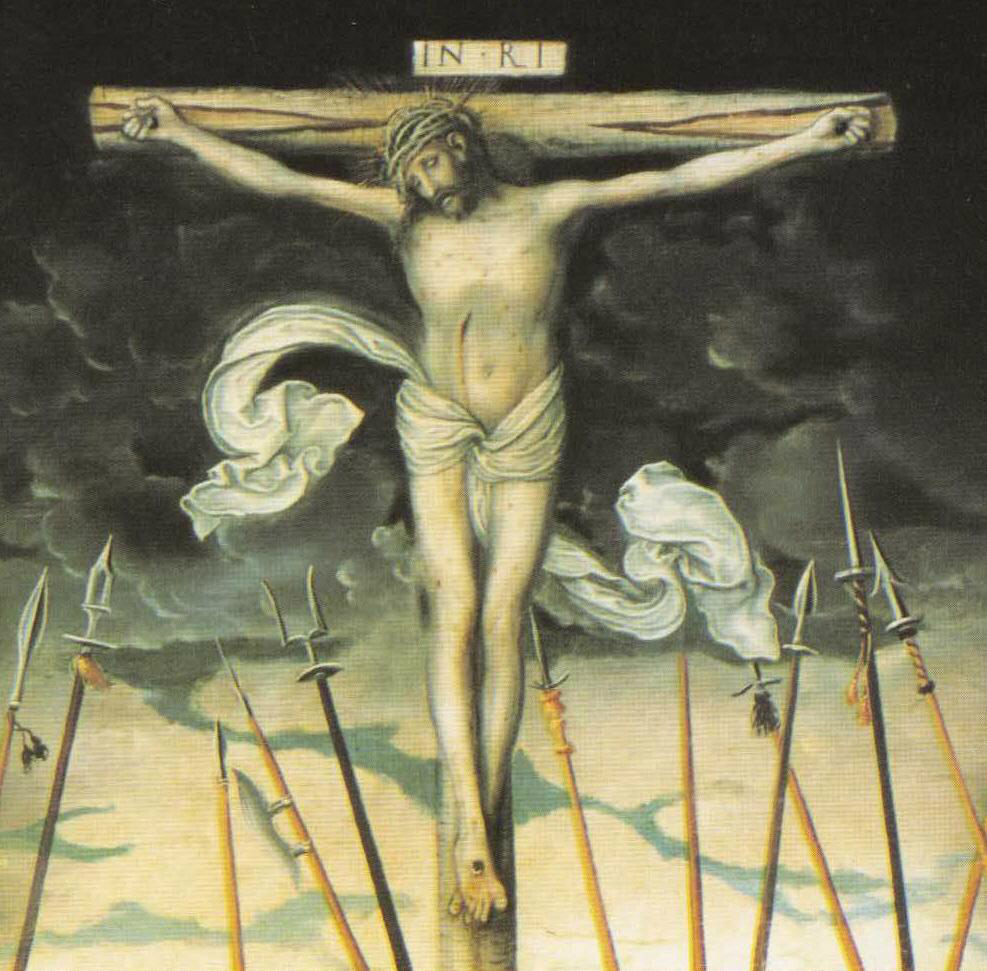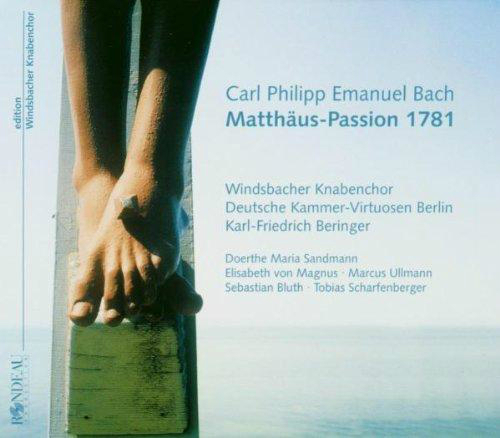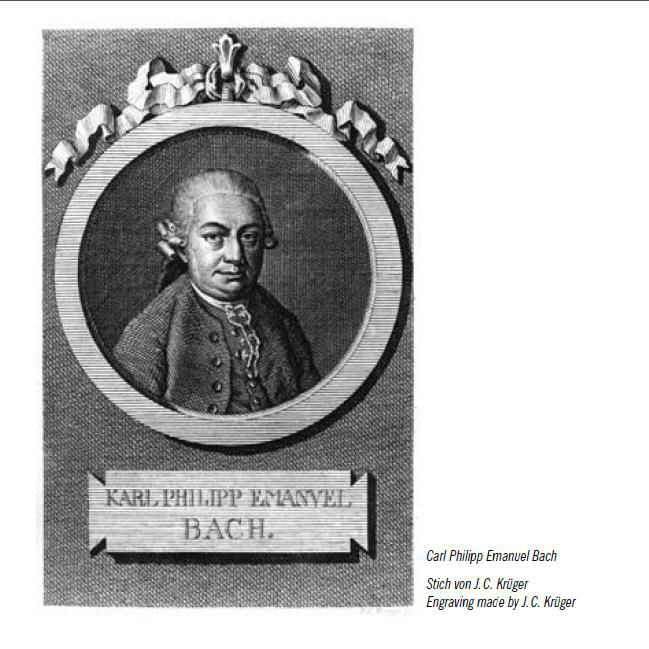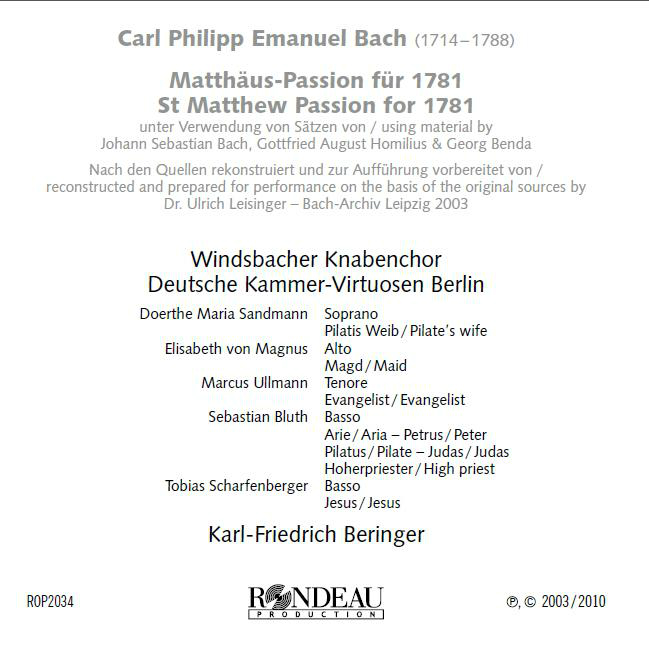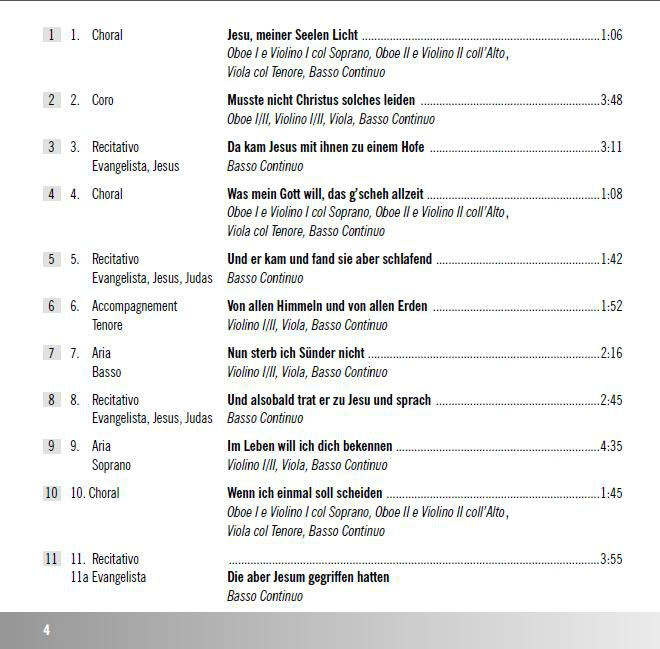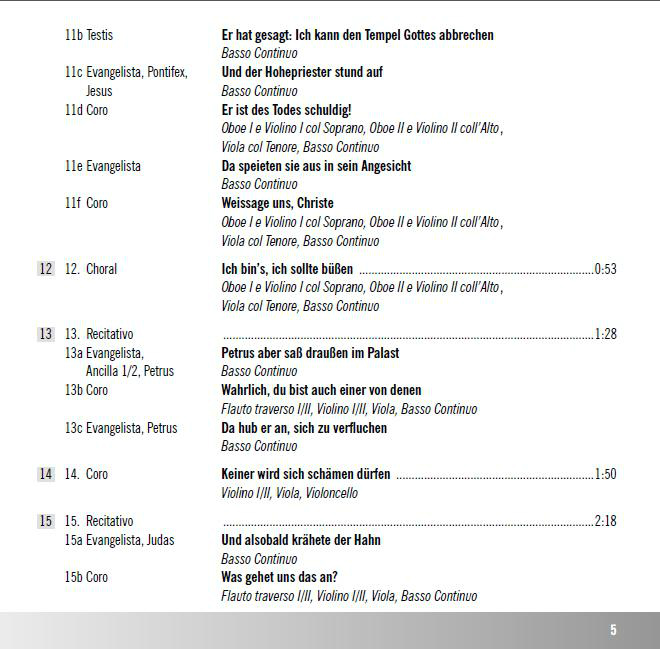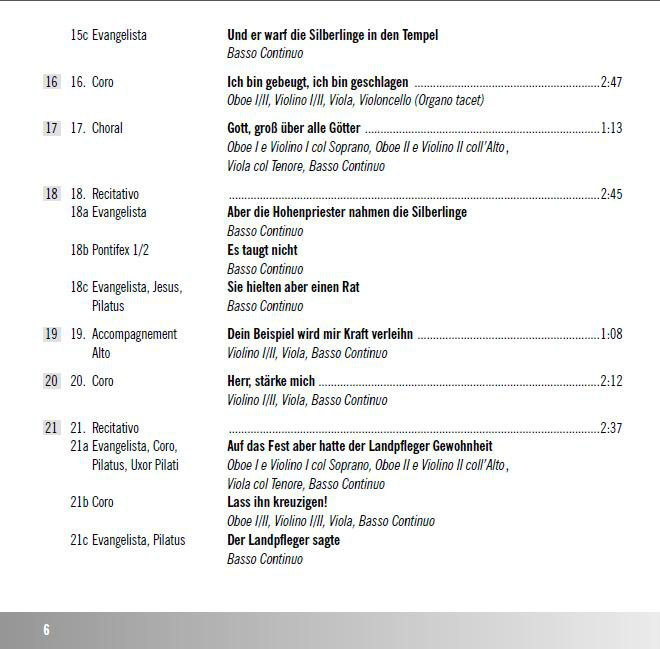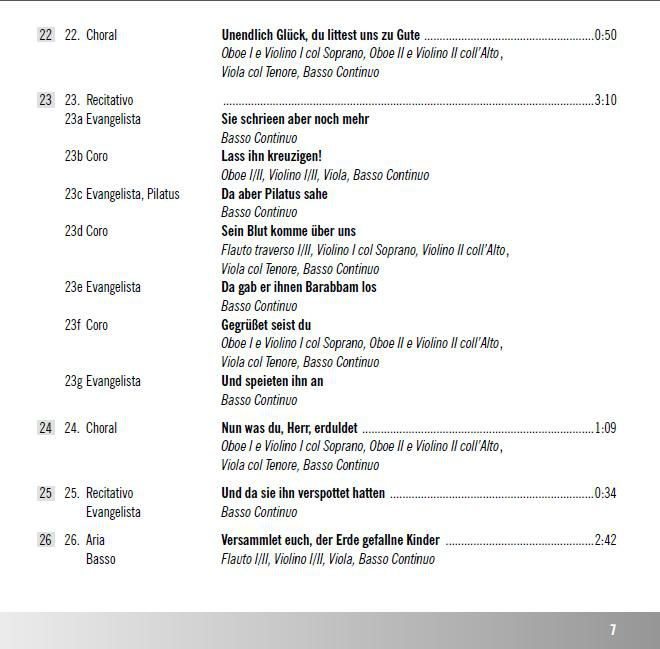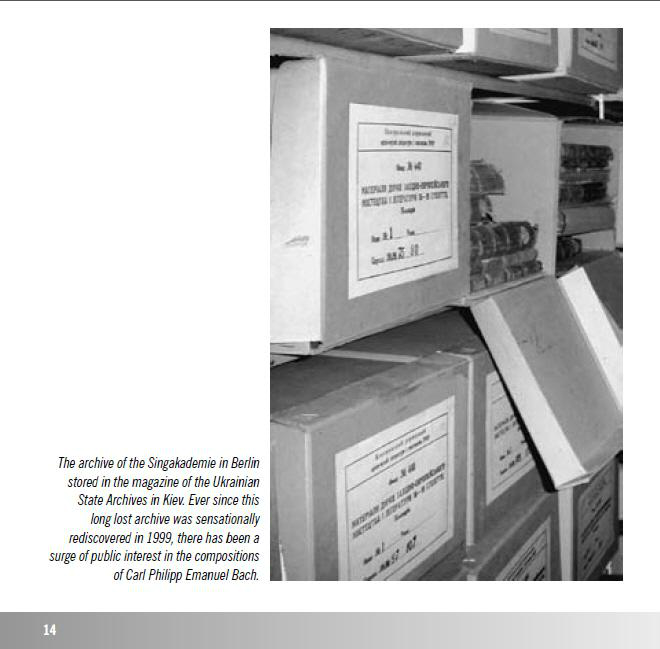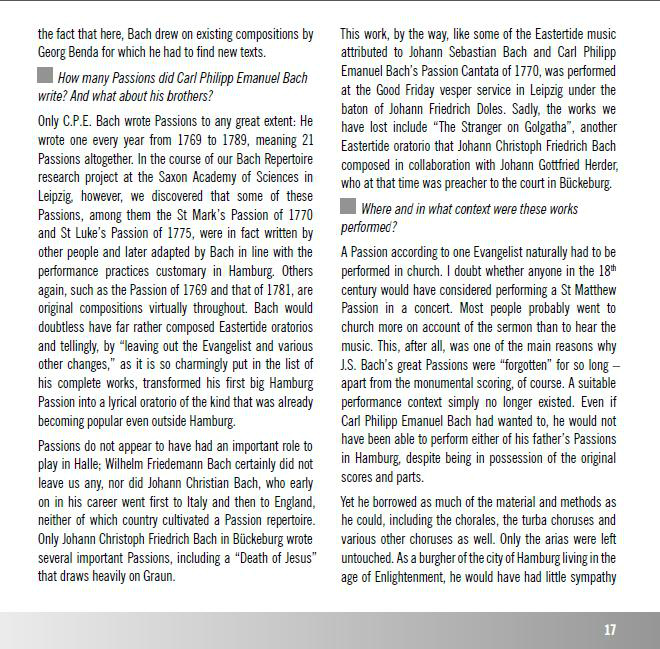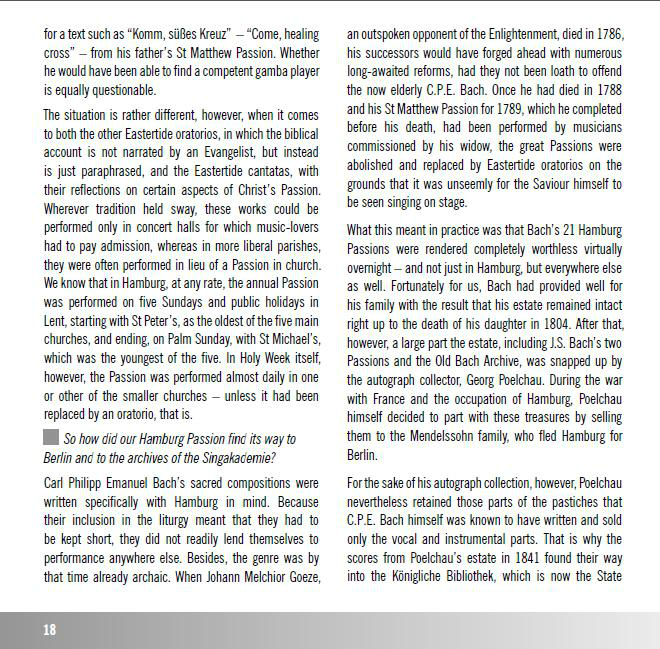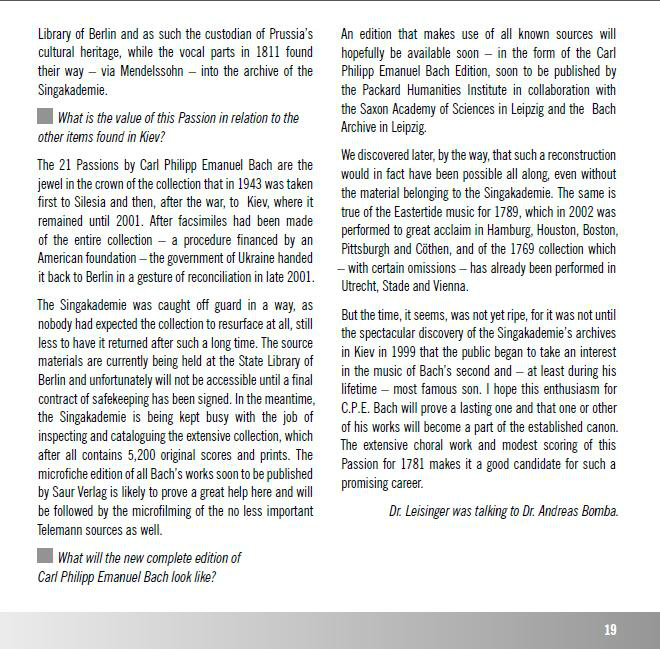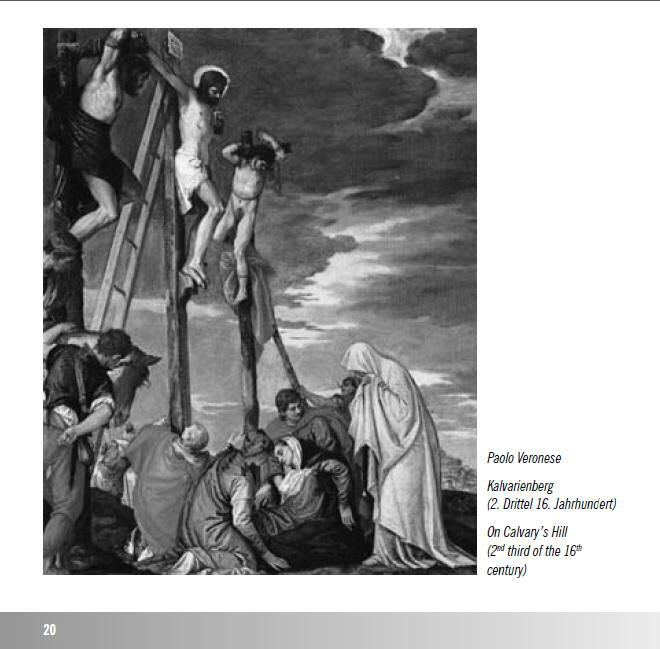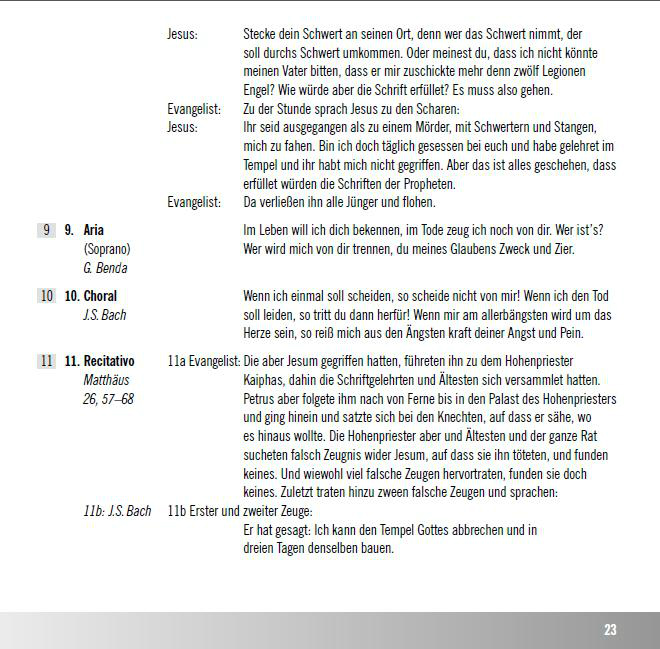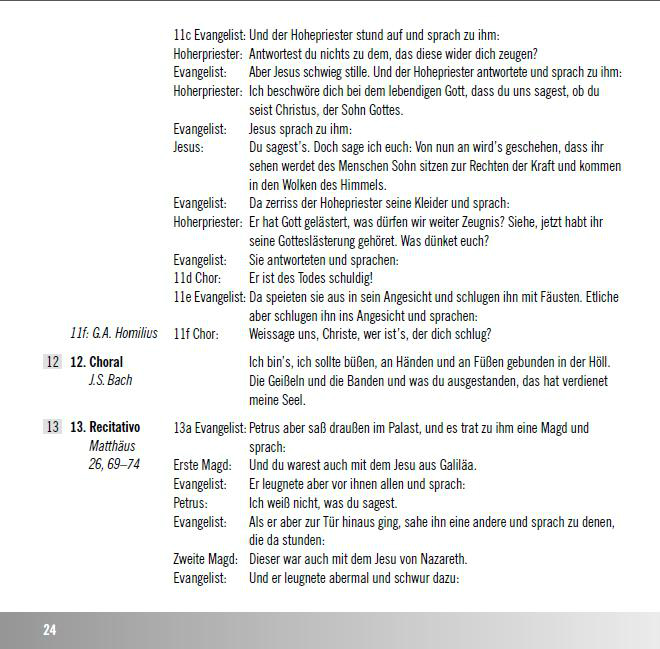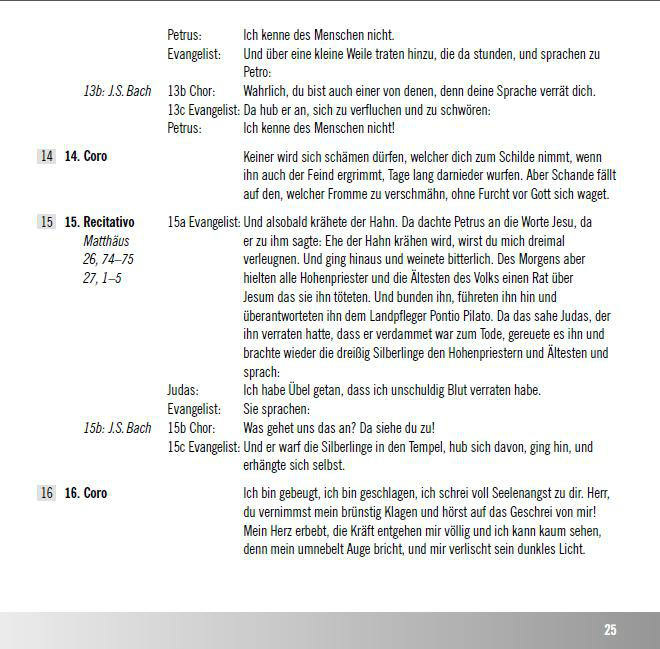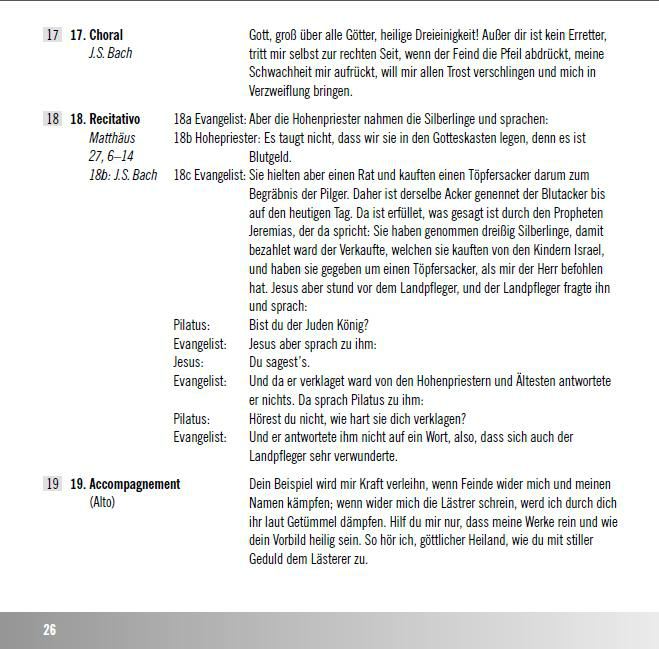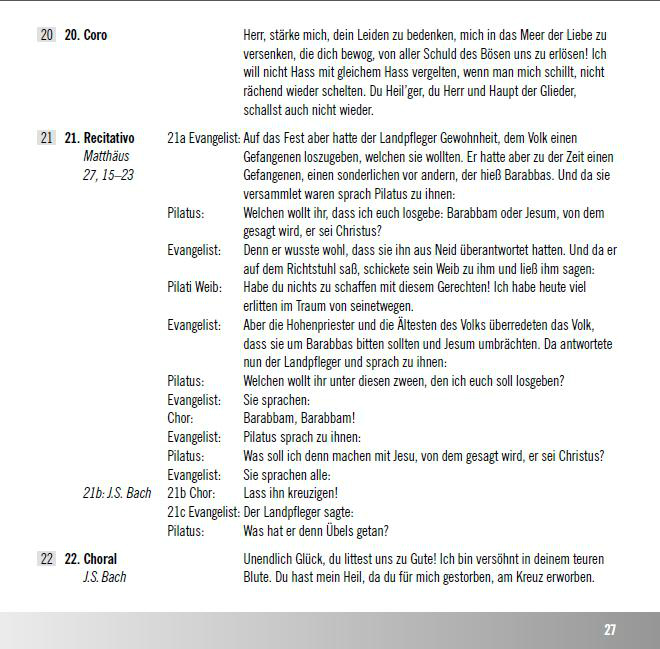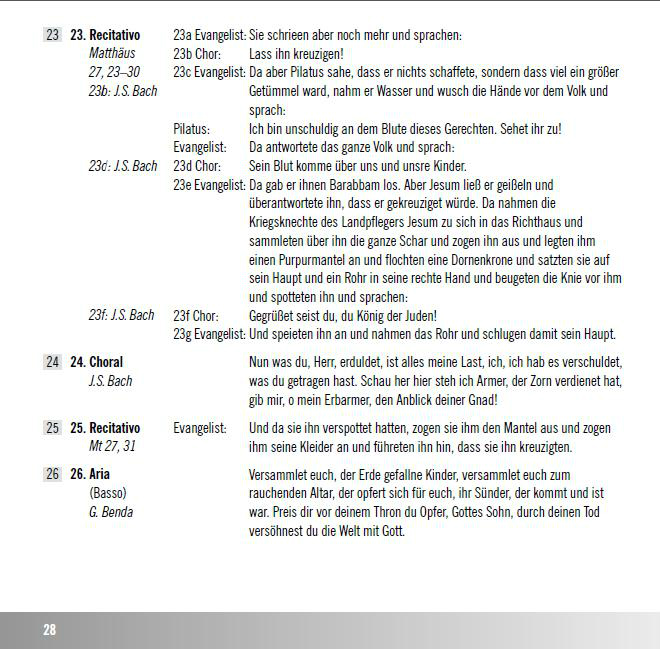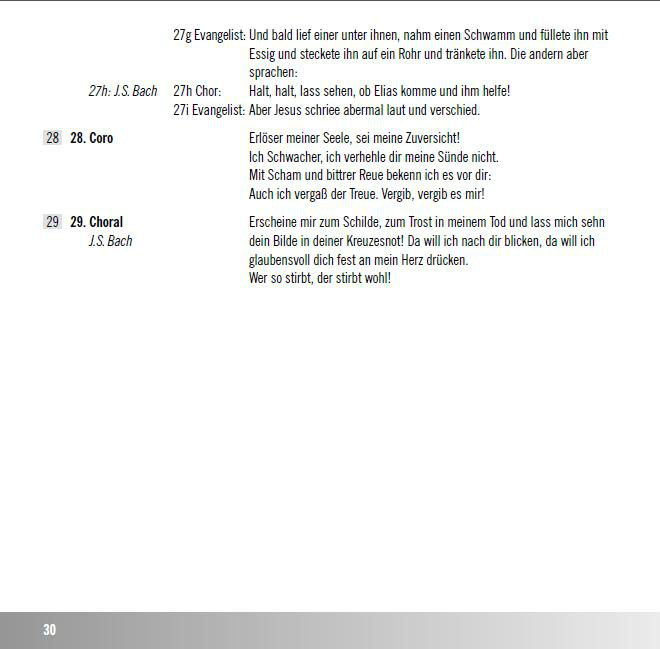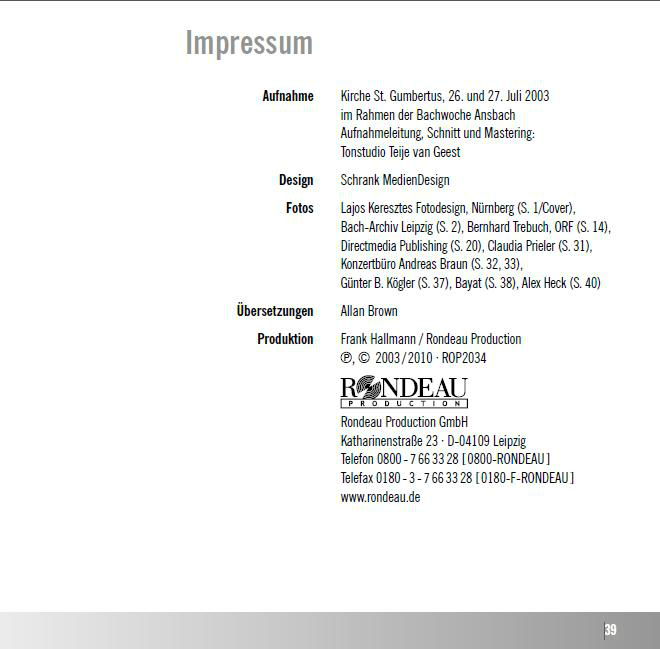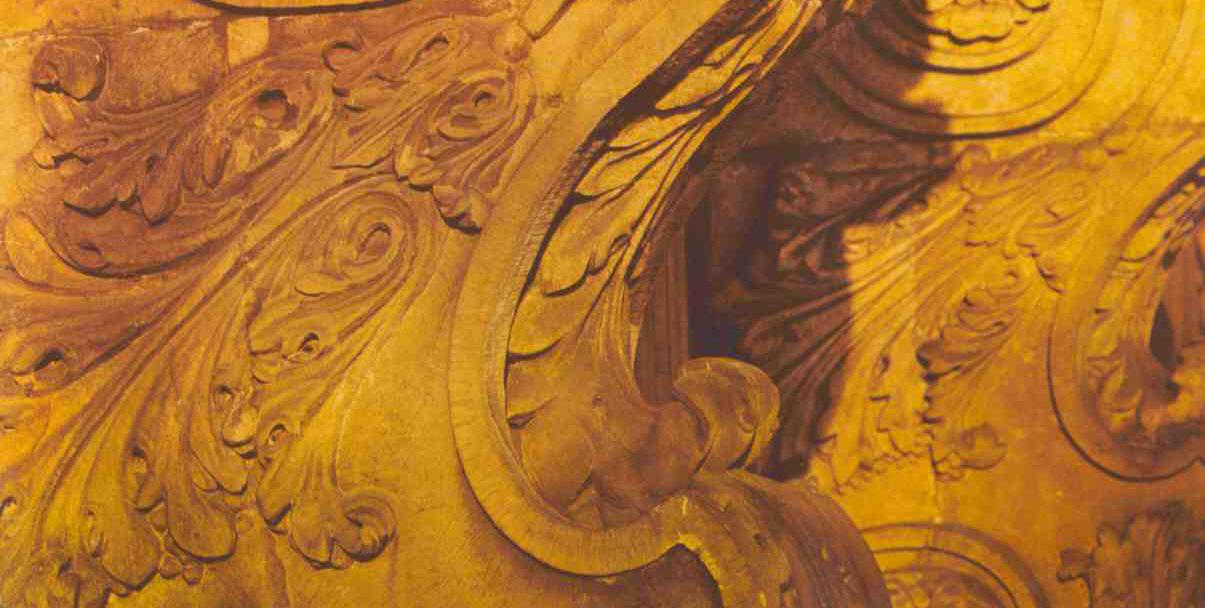
|
Matthäus-Passion, H. 798 (1781) | |
|
앨범: C.P.E. Bach: 마태 수난곡, H. 798 (1781)
Carl Philipp Emanuel Bach (1714 - 1788)
No. 1. Choral. Jesu, meiner Seelen Licht (Chorus) | |
|

|
Album Title: C.P.E. Bach: Matthäus-Passion, H. 798 (1781)
Composer: Carl Philipp Emanuel Bach (1714 - 1788)
Conductor: Karl-Friedrich Beringer
Performer: Sebastian Bluth (bass)
Tobias Scharfenberger (bass)
Doerthe Maria Sandmann (soprano)
Marcus Ullmann (tenor)
Elisabeth von Magnus (alto)
Choir: Winsdbacher Knabenchor (Windsbach Boys Choir)
Orchestra: Deutsche Kammer-Virtuosen Berlin (German Chamber Virtuosi Berlin)
Audio CD (May 29, 2004)
Number of Discs: 1
Recorded in: Stereo
Spars Code: n/a
Label: Rondeau Productions
Copyright: (C) 2004 Rondeau Productions
Time: 1:05:58
Genre: Classical Music
Style: Classical Sacred
Period: Classical (1750-1830)
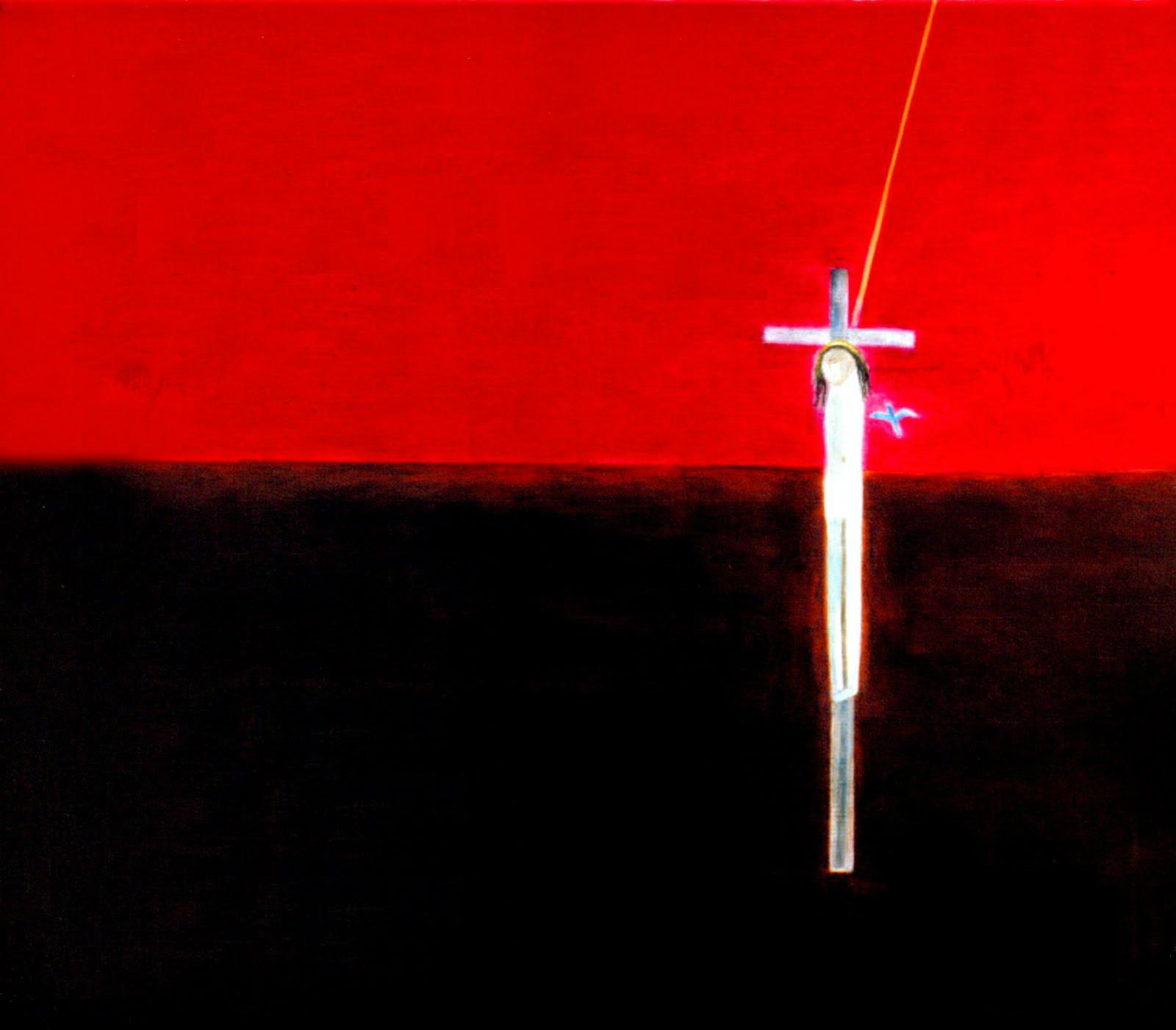
1–29 St. Matthäus Passion, H. 798 [fragment] (65:46)
Composer Carl Philipp Emmanuel Bach (1714 - 1788)
Lyricist Anonymous
Conductor: Karl-Friedrich Beringer
Performer Marcus Ullmann (Tenor)
Sebastian Bluth (Bass-baritone)
Tobias Scharfenberger (Bass)
Elisabeth von Magnus (Alto)
Doerthe Maria Sandmann (Soprano)
Ensemble Windsbach Boys Choir
Orchestra German Chamber Virtuosi Berlin
Period Classical
Written 1781; Germany
1. No. 1. Choral. Jesu, meiner Seelen Licht (Chorus) (1:06)
2. No. 2. Coro. Musste nicht Christus solches leiden (Chorus) (3:48)
3. No. 3. Recitativo. Da kam Jesus mit ihnen zu einem Hofe (Evangelist, Jesus) (3:11)
Performer Marcus Ullmann (Tenor)
Tobias Scharfenberger (Bass)
4. No. 4. Choral. Was mein Gott will, das g'scheh allzeit (Chorus) (1:08)
5. No. 5. Recitativo. Und er kam und fand sie aber schlafend (Evangelist, Jesus, Judas) (1:42)
Performer Marcus Ullmann (Tenor)
Sebastian Bluth (Bass)
Tobias Scharfenberger (Bass)
6. No. 6. Accompagnement. Von allen Himmeln und von allen Erden (Tenor) (1:52)
Performer Marcus Ullmann (Tenor)
7. No. 7. Aria. Nun sterb ich Sünder nicht (Bass) (2:16)
Performer Sebastian Bluth (Bass)
Tobias Scharfenberger (Bass)
8. No. 8. Recitativo. Und alsobald trat er zu Jesu und sprach (Evangelist, Jesus, Judas) (2:45)
Performer Marcus Ullmann (Tenor)
Sebastian Bluth (Bass)
Tobias Scharfenberger (Bass)
9. No. 9. Aria. Im Leben will ich dich bekennen (Soprano) (4:35)
Performer Doerthe Maria Sandmann (Soprano)
10. No. 10. Choral. Wenn ich einmal soll scheiden (Chorus) (1:45)
11. No. 11a. Recitativo. Die aber Jesum gegriffen hatten / 11b. Er hat gesagt: Ich kann den Tempel Gottes abbrechen / 11c. Und der Hohepriester stund auf / 11d. Er ist des Todes schuldig!… (Evangelist, Chorus, Jesus) (3:55)
Performer Marcus Ullmann (Tenor)
Tobias Scharfenberger (Bass)
12. No. 12. Choral. Ich bin's, ich sollte büßen (Chorus) (0:53)
13. No. 13a. Recitativo. Petrus aber saß draußen im Palast / 13b. Wahrlich, du bist auch einer von dene / 13c. Da hub er an, sich zu verfluchen (Evangelist, Petrus, Maidservants) (1:28)
Performer Marcus Ullmann (Tenor)
Sebastian Bluth (Bass)
14. No. 14. Coro. Keiner wird sich schämen dürfen (Chorus) (1:50)
15. No. 15a. Recitativo. Und alsobald krähete der Hahn / 15b. Was gehet uns das an? / 15c. Und er warf die Silberlinge in den Tempel (Evangelist, Judas, Chorus) (2:18)
Performer Marcus Ullmann (Tenor)
Sebastian Bluth (Bass)
16. No. 16. Core. Ich bin gebeugt, ich bin geschlagen (Chorus) (2:47)
17. No. 17. Choral. Gott, groß über alle Götter (Chorus) (1:13)
18. No. 18a. Recitativo. Aber die Hohenpriester nahmen die Silberlinge / 18b. Es taugt nicht / 18c. Sie hielten aber einen Rat - (Evangelist, High Priests, Jesus, Pilatus, Chorus) (2:45)
Performer Marcus Ullmann (Tenor)
Sebastian Bluth (Bass)
Tobias Scharfenberger (Bass)
19. No. 19. Accompagnement. Dein Beispiel wird mir Kraft verleihn (Alto) (1:08)
Performer Elisabeth von Magnus (Alto)
20. No. 20. Core. Herr, stärke mich (Chorus) (2:12)
21. No. 21a. Recitativo. Auf das Fest aber hatte der Landpfleger Gewohnheit / 21b. Lass ihn kreuzigen! / 21c. Der Landpfleger sagte (Evangelist, Pilatus, Chorus) (2:37)
Performer Marcus Ullmann (Tenor)
Sebastian Bluth (Bass)
22. No. 22. Choral. Unendlich Glück, du littest uns zu Gute (Chorus) (0:50)
Performer Marcus Ullmann (Tenor)
23. No. 23a. Recitativo. Sie schrieen aber noch mehr / 23b. Lass ihn kreuzigen! / 23c. Da aber Pilatus sahe / 23d. Sein Blut komme uber uns / 23f. Da gab er ihnen Barabbam los… (Evangelist, Chorus, Pilatus) (3:10)
Performer Sebastian Bluth (Bass)
24. No. 24. Choral. Nun was du, Herr, erduldet (Chorus) (1:09)
25. No. 25. Recitativo. Und da sie ihn verspottet hatten (Evangelist) (0:34)
Performer Marcus Ullmann (Tenor)
26. No. 26. Aria. Versammlet euch, der Erde gefallne Kinder (Bass) (2:42)
Performer Sebastian Bluth (Bass)
Tobias Scharfenberger (Bass)
27. No. 27a. Recitativo. Und indem sie hinaus gingen / 27b. Der du den Tempet Gottes zerbrichst / 27c. Desgleichen auch die Hohen priester spotteten sein / 27d. Andern hat er geholfen… (Evangelist, Chorus, Jesus) (6:29)
Performer Marcus Ullmann (Tenor)
Tobias Scharfenberger (Bass)
28. No. 28. Core. Erlöser meiner Seele, sei meine Zuversicht (Chorus) (2:27)
29. No. 29. Choral. Erscheine mir zum Schilde (Chorus) (1:23)
카를 필립 에마누엘 바흐: 마태 수난곡 1781
연주자: 되르테 마리아 잔트만, 엘리자베트 폰 마그누스, 마르쿠스 울만, 제바스치안 블루트, 토비아스 샤르펜베르거, 빈츠바흐 소년 합창단, 도미치 캄버-비르투오젠 베를린, 카를-프리드리히 베링거
1791년에 함브르크에서 초연되엇으나, 이후 잊혀지거나 분실되어 1999년에 키에프에서 발굴된 카를 필립 에마누엘 바흐의 마태 수난곡!
2003년에 드디어 빈츠바흐 소년 합창단에 의해 연주되었으며, 본 음반은 이 작품의 세계 최초 레코딩을 수록한 역사적 기록이기도 하다. 안스바흐의 성 굼베르투스 바로크 교회의 아름다운 울림이 잘 살아난 녹음 덕분에 현장의 감동은 더욱 생생하게 다가온다.
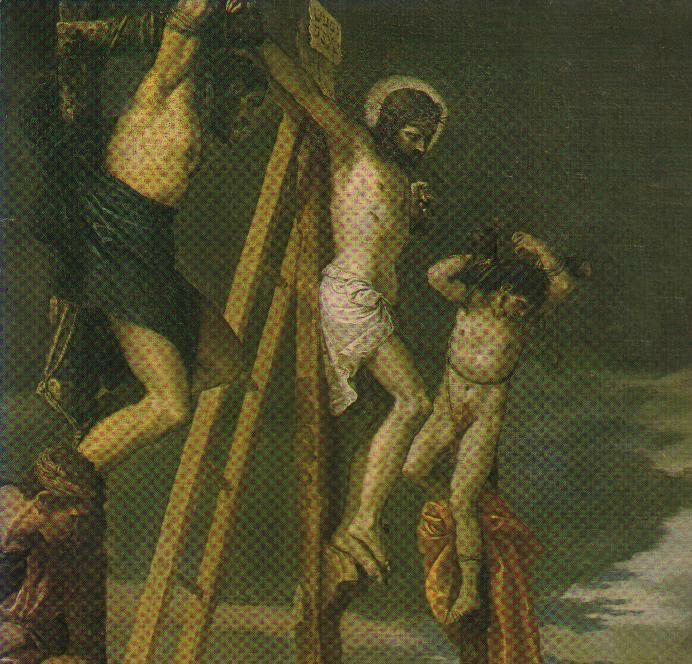
CARL PHILIPP EMANUEL BACH (1714 - 1788)
|
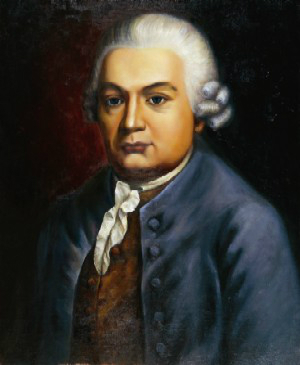
|
The second son of the great Johann Sebastian Bach by his first wife, CPE Bach was recognised as one of the greatest harpsichordists of his time. After study at university, a privilege denied his father, he became harpsichordist to the Crown Prince of Prussia, later Frederick the Great, and left his service in 1767 after the death of his godfather Telemann, whom he succeeded as director of music of the five city churches of Hamburg. He was greatly respected both as a composer and as a friend of some of the most distinguished writers and thinkers of his time. In 1755 he published his influential Essay on the True Art of Playing Keyboard Instruments. From his very considerable output, his sonatas for flute and harpsichord remain an attractive part of chamber music repertoire, and his symphonies written for Baron van Swieten, arbiter elegantium in Vienna, a man whose taste was generally trusted in artistic matters, are similarly notable. Music by CPE Bach is often listed with a reference number from the catalogue of his works by Wotquenne (Wq).
Orchestral Music
CPE Bach wrote a set of six string symphonies, Wq. 182, for Baron van Swieten—diplomat, Court Librarian in Vienna and patron of Haydn and Mozart—as well as a set of four orchestral symphonies, Wq. 183, that include wind instruments. Four flute concertos, Wq. 166–9, are arranged from the composer’s own harpsichord concertos, as are the three cello concertos, Wq. 170–2, and the oboe concertos, Wq. 164–5.
Chamber Music
The varied chamber music of CPE Bach includes five sonatas for flute and harpsichord, Wq. 83–7, five trio sonatas for flute, violin and basso continuo, Wq. 143–7, and an unusual sonata for solo flute, Wq. 132.
Keyboard Music
CPE Bach wrote a great deal of music for the instruments on which he was acknowledged to be pre-eminent as a performer: the harpsichord and the gentler clavichord. These include six sonatas, Wq. 49, and twelve variations on the best known of contemporary themes for variations, La Folie d’Espagne, Wq. 118.9.
Doerthe Maria Sandmann
|
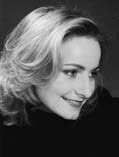
|
Doerthe Maria Sandmann trained as a soprano at the Hochschule für Musik Hanns Eisler in her native Berlin, graduating in both Vocal and Opera Studies. She also took master-classes with both Elisabeth Schwarzkopf and Eberhard Büchner.
Her countless concert engagements and various operatic roles have since taken her to the Händelfestspiele Halle, the Dresdner Musikfestspiele, the Bachtage Berlin and to festivals in Austria, Italy, the Netherlands and the USA as well. There, she has appeared in numerous roles in works by Wolfgang Amadeus Mozart, Joseph Haydn and Georg Friedrich Handel, as well as singing the soprano parts in cantatas and oratorios by various composers from Monteverdi to Mendelssohn.
A specialist in Ancient Music, Sandmann has sung with ensembles and orchestras of renown, such as the Lautten Compagney
Berlin, the Combattimento Consort Amsterdam, the Wiener Akademie, the Thomanerchor Leipzig, the Windsbacher Knabenchor, the Gewandhausorchester and the Berliner Philharmoniker.
Her extensive repertoire ranges from sacred works of the 16th, 17th and 18th centuries to lieder by Fanny Mendelssohn, Clara Schumann, Hugo Wolf and Ernst Pepping.
Elisabeth von Magnus
|

|
After studying recorder at the Vienna Conservatory, Elisabeth von Magnus began training as an actress at the Mozarteum in Salzburg.
She then went on to study singing under Kammersängerin Hertha Töpper at the Opera School of the Hochschule für Musik München. While still a student in Munich, she also attended classes in lieder interpretation with Paul Schilhawsky in Salzburg and worked as a freelance radio presenter for Austrian Radio, where she also had a chance to present her own radio programmes.
Her career as a singer began with her operatic debut in the part of Polly in a production of Benjamin Britten’s “Beggar’s
Opera” at the Marstalltheater in Munich. Since then, she has performed in countless concert halls and opera houses in almost every country in Europe as well as both the USA and Japan.
In addition to all the great mezzo soprano roles, von Magnus has also performed in all Bach’s big oratorios and has given concert performances of arias and cantatas by Mozart and Haydn and various solo works by Rossini, Berlioz, Respighi and Berg.
Marcus Ullmann
|
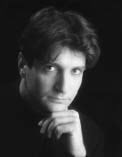
|
The lyrical tenor Marcus Ullmann is a native of Olbernhau near Dresden. He received his first musical training as a chorister in the Dresdner Kreuzchor and later went on to study first with Hartmut Zabel and Margret Trappe Wiel at the Dresden Academy of Music, and later with Dietrich Fischer-Dieskau in Berlin and Marga Schiml in Karlsruhe.
After graduating with distinction in all three disciplines (lieder, concert and operatic singing), he accepted a number of guest engagements for example at the Semperoper Dresden, the Teatro del’opera di Roma and the Los Angeles Opera, where his interpretation of various Mozart parts and Bach’s St John Passion and Mass in B minor earned him widespread acclaim.
Ullmann’s performing career has taken him to all the most important classical music centres in Europe as well as to North and South America and to Japan. The conductors he has performed under include Frieder Bernius, Helmuth Rilling and Peter Schreier. He also makes regular guest appearances with the Dresdner Kreuzchor, the Windsbacher Knabenchor and the St Thomas Boys Choir Leipzig. Ullmann has given lieder recitals at various chamber music festivals. He has performed with a number of pianists of renown at the Wigmore Hall in London, the Concertgebouw in Amsterdam and the Opera House in Cairo.
Sebastian Bluth
|

|
The Berlin baritone Sebastian Bluth studied singing at the Hochschule für Musik Hanns Eisler Berlin under Peter Tschaplik. He attended Dietrich Fischer-Dieskau’s Lieder classes, and also took lessons from Elisabeth Schwarzkopf and Peter Schreier.
In 1992 he won a prize in the Paula Lindberg-Salomon Competition, and as a young singer he made his debut with a Lieder evening at the “Schubertiade Feldkirch”. This was followed by concerts in Germany and other countries; for instance, he appeared at the “Schubert-Zyklus” of the Philharmonie Köln, as a guest in concerts at the Gasteig in Munich, in the Berlin Philharmonie and the Konzerthaus in Berlin, and at concerts in aid of the reconstruction of the Frauenkirche in Dresden.
He has made his appearance in numerous oratorio and opera productions with the Gewandhausorchester, the Thomanerchor Leipzig, and the Radio-Sinfonieorchester Stuttgart. He also sang at the Kurt-Weill-Festspiele and the Musikfestspiele Potsdam. Radio and television productions testify to the spectrum that this singer covers.
His repertoire stretches from baroque operas like “Dido and Aeneas” and Age Romanticism oratorios such as Brahms’ “Ein deutsches Requiem” right through to 20thcentury songs. His first solo CD appeared in 1998, and contained Lieder by Robert Schumann.
Tobias Scharfenberger
|
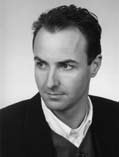
|
After receiving his first private singing lessons with Vera Ilieva in Trier, Tobias Scharfenberger went on to study under Profs. Gerhard Faulstich and Roland Hermann at the Hannover and Karlsruhe conservatories. He also took master-classes with Aldo Baldin, Brigitte Fassbaender, Peter Schreier and Thomas Allen, and attended courses in lieder interpretation with Duo Mitsuko Shirai/Hartmut Höll and Roger Vignoles.
Tobias Scharfenberger’s singing career began while still a student with engagements at various opera houses including that in Frankfurt am Main (since 1991), the Staatsoper Stuttgart, Staatstheater Kassel, Musiktheater im Revier Gelsenkirchen, the Deutsche Oper am Rhein Düsseldorf and the Theater Klagenfurt.
From 1995 to 1997, Scharfenberger was engaged as a lyrical baritone by the Bielefelder Theater, where he played not only such important roles as Papageno (Die Zauberflöte), Graf Almaviva (Le nozze di Figaro), the title role in Rossini’s Barbiere di Siviglia and Dr. Falke (Die Fledermaus), but also such lesser known parts as Graf Siegfried in Schumann’s only opera, Genoveva. His numerous concert engagements have enabled him to work with such renowned conductors as Karl-Friedrich Beringer, Hanns-Martin Schneidt, Wolfgang Sawallisch, Kent Nagano and Zubin Mehta.
Deutsche Kammer-Virtuosen Berlin
|

|
Consisting of soloists and members of the Deutsches Symphonie-Orchester Berlin, the Deutsche Kammer-Virtuosen Berlin were founded in 1995 by Joachim Pliquett.
This ensemble has set itself the aim of presenting ancient music in new ways. The distinguishing features of this orchestra are that they arrange their own series of concerts, with a presenter, in the Chamber Music Room of the Berlin Philharmonie, they work as a team and usually without a conductor, and create unconventional forms of concert events such as the Brandenburgische Sommerkonzerte.
The musicians expressly state their belief in their “modern” instrumentation. In this way, and through their constant and intense joint grappling with the original scores, they produce dynamic interpretations of ancient music which take their line form a modern ideal of musical sound.
The ensemble has already collaborated with artists such as Jochen Kowalski, Edith Mathis, Igor Oistrach and Thomas Cantor Georg Christoph Biller. The first CD production appeared in 1997 with works by Johann Sebastian Bach recorded in the Convent and Pilgrimage Church of Neuzelle. A project with works by Georg Friedrich Handel (presented by Bernhard Morbach) was broadcast live and nation-wide by Deutschlandradio Berlin, and this was followed in 1999 by the television recording of a Christmas Concert by the ORB television station.
Windsbacher Knabenchor
|

|
Unmistakable, first class, professional: just a few of the adjectives used by the media to praise the artistic excellence of the Windsbacher Knabenchor. Founded in 1946 by Hans Thamm in the little town of Windsbach, deep in Middle Franconia, the choir is nowadays regarded as “one of the leading choral ensembles of the international music scene” (Märkische Allgemeine), and their “excellent sound” a guarantee (Main-Post).
In concert halls and churches around the world, the “Windsbacher” and their director Karl-Friedrich Beringer bring choral music of all styles and eras to life, with performances of an enviably high quality. Thus, as well as the great oratorios – such as Bach’s Mass in B Minor, the St Matthew and St John Passions, Mozart’s masses, Mendelssohn’s Elias, Handel’s Messiah, or Stravinsky’s Symphony of Psalms – their repertoire includes many a cappella works.
The seventy or so singers perform about sixty times a year.
Tours within Germany and Europe are as much part of the schedule as is the participation in international festivals and extended trips to Latin America, Australia or Asia. Though the Windsbacher Knabenchor has left its musical calling card at many festivals around the world and put its name to countless CDs, its home remains a boarding school sponsored by the Evangelical Lutheran Church in Bavaria.
Karl-Friedrich Beringer
|

|
Director of the Windsbacher Knabenchor since 1978, Karl-Friedrich Beringer has led the ensemble to international fame. An inspired choral director who motivates singers to “highly sensitive and finely tuned musical differentiation by virtue of his unambiguous conducting style”, and an orchestral conductor, he is one of the most sought-after artists in the music world today (Main Post).
Beringer studied music at the Meistersinger konservatorium in Nuremberg.
While still a student, he founded the Amadeus Choir; from 1976 till 1978, he was responsible for the artistic direction of the Internationales Jugend Festspielorchester Bayreuth, and in 1978, he was offered the directorship of the Windsbacher Knabenchor.
In addition to his committed work with the Windsbacher Knabenchor and their a cappella repertoire, Beringer has fostered close ties with leading orchestras, instrumentalists and singers. He has directed performances of various oratorios – not least those by Bach, Handel, Mozart, and Mendelssohn – to critical acclaim. At present, he is engaged in projects with the Münchener Kammerorchester, the Münchner Rundfunkorchester, the Deutsches Symphonie- Orchester Berlin and the Deutsche Kammer-Virtuosen Berlin. Since 1981, Karl-Friedrich Beringer has appeared in various prestigious concert series and music festivals both in Germany and elsewhere.
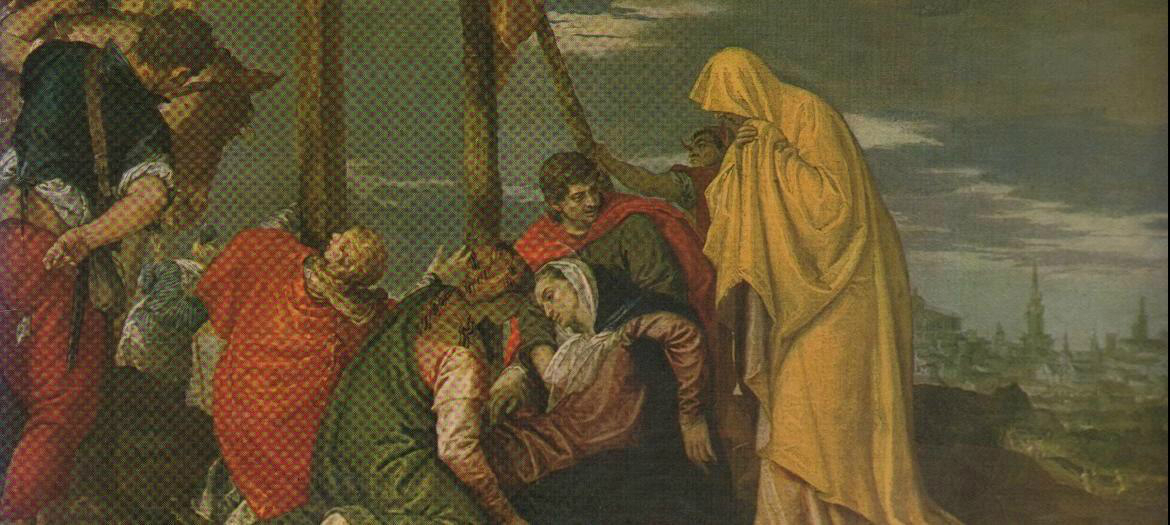
 곧 미남 리차드강 어리버리 돈키호테. 곧 미남 리차드강 어리버리 돈키호테.
|




